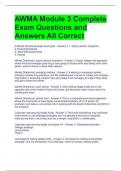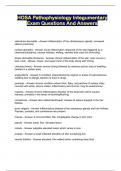AWMA Module 3 Complete
Exam Questions and
Answers All Correct
4 Market directional hedge fund types - Answer ✔ 1. Equity (sector) long/short
2. Emerging Markets
3. Short-selling/short bias
4. Activist
Market Directional, equity (sector) long/short - Answer ✔ classic hedge fund approach,
where the fund manager goes long a core group of stocks while also being short other
stocks, and/or futures or stock index options
Market Directional, emerging markets - Answer ✔ Investing in emerging markets
primarily involves long positions, and the inefficiencies in terms of market and company
information in emerging markets may give hedge fund managers an edge if they study
and get to know the market.
Market Directional, short selling - Answer ✔ Short-selling hedge funds are on the
opposite side of the market of long-only funds, and obviously make money when the
market goes down.
Market Directional, activist fund - Answer ✔ This is a corporate governance approach
where the fund tends to have highly concentrated positions (5 to 15 stocks, for
example), and takes a very active role in working with the board of directors and CEO of
the company
Corporate restructuring hedge funds - Answer ✔ The funds themselves may call these
event-driven or risk arbitrage strategies, but it is typically some sort of corporate
restructuring that is occurring, such as a merger, acquisition, or bankruptcy.
Corporate restructuring hedge fund types (4) - Answer ✔ -Distressed securities
-Merger arbitrage
-Event-driven
-Reg-D
Convergence trading hedge funds - Answer ✔ Convergence trading is essentially
arbitrage—but not necessarily "true arbitrage," which is namely riskless profits.
, Oftentimes, a fund manager may be long one security and short a similar, but not
identical, security.
Corporate restructuring, distressed securities - Answer ✔ hedge funds that invest in this
area are looking for distressed securities—securities that are trading below their intrinsic
value
Corporate restructuring, merger arbitrage - Answer ✔ Hedge funds that carry out
merger arbitrage are attempting to take advantage of price disparities that can occur
when one company is acquiring another.
Corporate restructuring, event-driven - Answer ✔ Hedge fund managers in the event-
driven space are investing based upon anticipated outcomes of significant events that
can occur during the life cycle of companies—events such as restructurings, mergers
and acquisitions, spin-offs, reorganizations, share buybacks, special write-offs or
dividends, or any other significant market event.
Corporate restructuring, Reg-D - Answer ✔ There are different strategies that can be
employed with Reg. D offerings, but the main advantage these funds have is that they
often will be priced lower than similar publicly traded securities. The fund can either hold
the securities outright, or short similar but more highly priced public securities against
the long position.
Convergence trading, fixed-income arbitrage - Answer ✔ Fixed- income arbitrage is
buying one fixed-income investment and simultaneously selling another similar fixed-
income investment, with the expectation that the prices will converge in the future.
Convergence trading, convertible bond arbitrage - Answer ✔ Managers make their
money by looking for pricing discrepancies among the bond, its conversion value, and
the current value of the company's stock.
Convergence trading, equity market-neutral - Answer ✔ market-neutral funds go long
and short the market. The goal is to completely neutralize the market and industry risk,
and concentrate solely on stock selection
Convergence trading, relative value arbitrage - Answer ✔ Relative value arbitrage is
wide open, and these funds can invest in a variety of arbitrage strategies, including
those we have just covered. The term relative value arbitrage comes from the fact that
the fund manager is comparing one security and seeing how cheap or expensive it may
be compared to a second security. Relative value arbitrage is not betting on the
direction of the market, but rather what will happen with the pricing between two
securities.
Private Equity - Answer ✔ a general term that refers to distinct strategies that deal with
non-publicly traded investments





